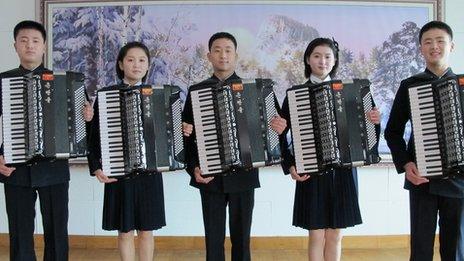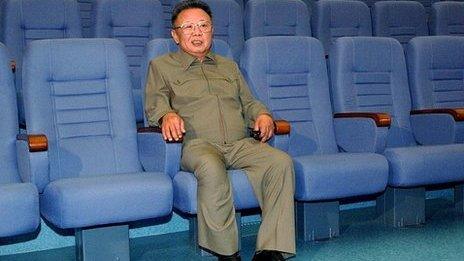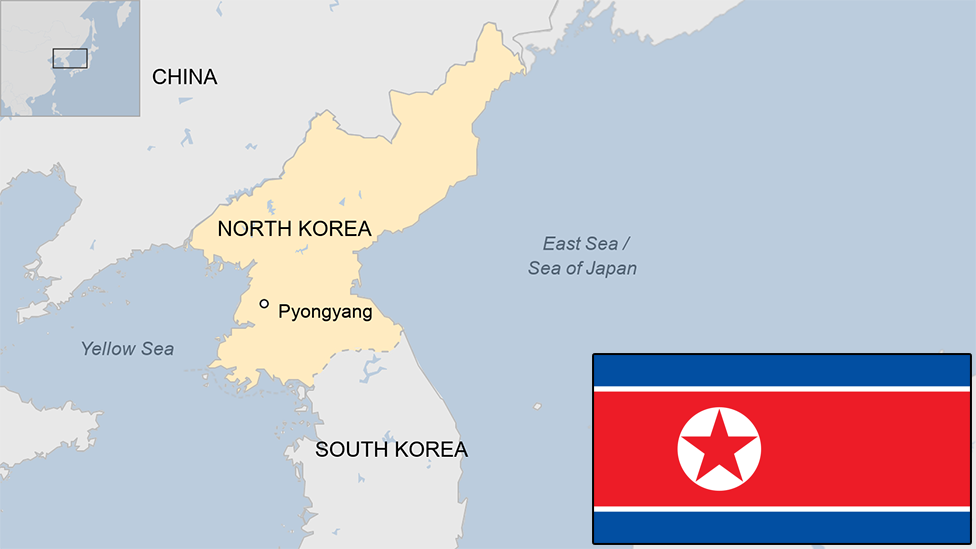Comedy makes North Korean film history
- Published
Comrade Kim Goes Flying is the tale of a young woman coalminer who dreams of becoming a trapeze artist.
At the Pyongyang International Film Festival in North Korea history is being made with the screening of Comrade Kim Goes Flying - the country's first romantic comedy to be co-produced with Western partners.
It has been described as a Disneyesque story of a young coal miner who dreams of becoming a trapeze artist.
With its individualistic "girl-power" theme the film's British co-director, Nick Bonner, sees this fairytale as quite unlike a typical North Korean picture.
"It's very different. It's the story of a young girl wanting to fulfil her dreams, going against her father's wishes, being cheeky, and getting there, propelling herself forward," he says.
The film is also unusual, he adds, because it is driven by a feisty female protagonist with the leading male character relegated to second position.
Comrade Kim Goes Flying was shot in North Korea with an all Korean cast.
It brings together the talents of Nick Bonner, who has a long history of organising tours and making documentaries in North Korea, with those of Belgian producer Anja Daelemans.
They teamed up with a North Korean producer and director to create the final product.
"It is a very unique collaboration," said Anja Daelemans. "I think it never happened before that there was really such a close collaboration to make a movie in two different cultures, so we had a North Korean culture, European culture, and we really wanted to bring them together."
"We as European filmmakers did not have the intention to bring our European stamp into the story, but we wanted to make a universal story."
The Korean cast members involved in the trapeze sequences display a lot of prowess. Nick Bonner says they made the decision early on to forgo actors.
"We decided that really the best way to portray this film would be to find actual physical acrobats and train them to become actors, rather than waiting years while we trained actors to become artists," he says.
For Anja Daelemans the goal of the project was to create entertainment.
Film diplomacy?
North Korea's motives may have been connected with maintaining the profile of its film industry to catch up with South Korea.
Film critic Grady Hendrix, who closely follows trends in Asian cinema, says: "I think they've seen South Korea have a very strong film presence internationally and they want to push more overseas."
Comrade Kim Goes Flying was recently shown at the Toronto Film Festival where is struck some critics as having camp value. Others saw it as propaganda - it certainly does make North Korea look like a happy land of plenty.
Nick Bonner does not see his film as making any kind of statement about North Korea.

Han Jong-sim (left) and Pak Chung-guk (right) are acrobats-turned actress and actor
"It was never intended as an insight into North Korea. It's the story of a young girl who's a coal miner fulfilling her dreams. It's as simple as that," he says.
Anja Daelemans adds: "We didn't want to make a propaganda movie at all. We just wanted to make a movie for entertainment's sake - it was light and it was fun and it was just very nice and entertaining."
Comrade Kim Goes Flying is going to face a challenge in securing distribution deals enabling it to be seen in cinemas.
"You've got to realise most of the value in it internationally is novelty value," says Grady Hendirx. "One country, maybe two, might pick it up for a limited art house distribution, but this is not going to be a widely seen film."
"It does lay the way for more films to come in the future, and there might be something that clicks more with an international audience, but I don't know if this movie is going to be it."
But in what amounts to a major coup for its producers Comrade Kim Goes Flying recently got selected for showing next month at the prestigious Busan International Film Festival in South Korea.
The filmmakers are very pleased that both North and South Korea will now be sharing, and they hope enjoying, the same piece of pop culture.
- Published9 July 2012

- Published10 February 2012

- Published19 December 2011

- Published30 December 2010
- Published19 July 2023
